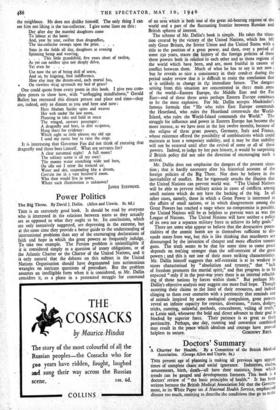Power Politics
The Big Three. By David J. Dallin. (Allen and Unwin. 8s. 6d.)
THIS is an extremely good book. It should be read by everyone who is interested in the relations between states as they actually are as opposed to what they ought to be. Its conclusions, which are only tentatively suggested, are depressing in the extreme, but at the same time they provide a better guide to the understanding of international problems than any of the encouraging declarations of faith and hope in which the great powers so frequently indulge. To take one example. The Persian problem is unintelligible if it is considered simply as a question of treaty obligations, or of the Atlantic Charter or the Charter of the United Nations, and it is only natural that the debates on this subject in the United Nations Organisation should have degenerated into acrimonious wrangles on intricate questions of procedure. But the problem assumes an intelligible form when it is considered, as Mr. Dallin considers it, as a phase in a protracted struggle for command
of an area which is both one of the great oil-bearing regions of the world and a part of the fluctuating frontier between Russian and British spheres of interest.
The scheme of Mr. Dallin's book is simple. He takes the situa- tion created by the victory of the United Nations, which has left only Great Britain, the Soviet Union and the United States with a title to the position of a great power, and then, over a period of some 25o years, traces the history of the foreign policies of these three powers both in relation io each other and to those regions of the world which have been, and are, most fruitful in causes of conflict between them. Much of what he has to say is not new ; but he reveals so nice a consistency in their condi:ct during the period under review that it is difficult to resist the conclusion that
it is unlikely. to change in immediate future. The dangers arising from this situation are concentrated in three main _areas of the world—Eastern Europe, the Middle East and the Far East=and of these three areas perhaps Eastern Europe continues to be the most explosive. For Mr. Dallin accepts Mackinder's famous formula that " He who rules East Europe commands the Heartland, who rules the Heartland commands the World- Island, who rules the World-Island commands the World." The struggle for influence and power in Eastern Europe has become the more intense, as we have seen in the last twelve months, because of the eclipse of three great powers, Germany, Italy and France. whose existence offered the possibility of combinations which could maintain at least a temporary stability, and it may be that stability will not be restored until after the revival of some or all of these powers. Indeed, to judge by her past history, it would be surprising if British policy did not take the direction of encouraging such a revival.
Mr. Dallin does not emphasise the dangers of the present situa- tion ; that is hardly necessary after his historical account of the foreign policies of the Big Three. Nor does he believe in the inevitability of conflict. But he vigorously attacks the illusion that the United Nations can prevent world war. " The United Nations will be able to prevent military action in cases of conflicts among small nations which do not have the backing of the big. In all other cases, namely, those in which a Great Power is interested in the affairs of small nations, or in which disagreement among the Great Powers has reached a stage where no compromise is possible, the United Nations will be as helpless to prevent wars as was the League of Nations. The United Nations will have neither a policy of its own nor a separate military force to achieve its lofty goals."
There are some who appear to believe that the destructive poten- tialities of the atomic bomb are in themselves sufficient to dis- suade states from war, but this is like thinking that murderers are discouraged by the invention of cheaper and more effective tommy guns. The truth seems to be that for some time to come peace depends on nothing stronger than the self-restraint of the great powers ; and this is not one of their more striking characteristics. Mr. Dallin himself suggests that self-restraint is at its weakest in states characterised by " absolutism and tyranny," that " lack of freedom promotes the martial spirit," and that progress is to be expected "only if in the post-wax years there is an internal rebuild- ing of those nations by forces within them." But perhaps Mr. Dallin's objective analysis may suggest one more frail hope. Though asserting their claims to the limit of their resources, and indeed clinging to them over centuries with a pertinacity that reminds one of animals inspired by some zoological compulsion, great powers reveal an infinite capacity for retreats, diversions, " ruses, dodges, tricks, cunning, unlawful methods, concealment, veiling of truth," as Lenin said, whenever the bold and direct advance to their goal is blocked by superior force. Their patience is as great as their pertinacity. Perhaps, one day, cunning and cowardice combined may result in the peace which idealism and courage have proved


























 Previous page
Previous page